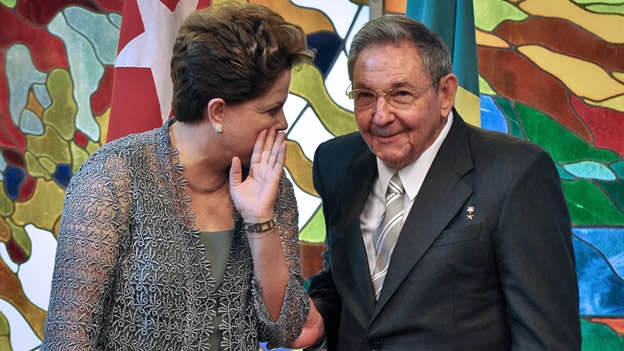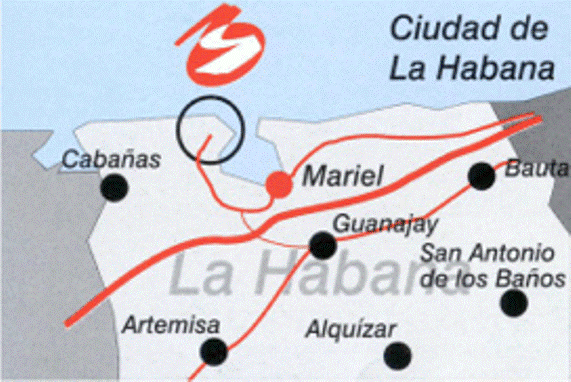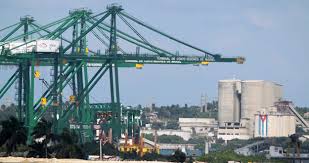HAVANA, Cuba – The first 700 meters of dock of the Mariel mega-port are inaugurated by the presidents of Cuba, Raul Castro, and Brazil, Dilma Rousseff, in parallel to the II Summit of CELAC (Community of Latin American and Caribbean States).
Rousseff ’s government — Cuba’s the second largest trading partner after Venezuela — has funded 75 percent of the works. Four years ago it gave the island a credit of $600 million and is studying whether to award a second. The center of the project is the mega-port. The bay of the capital will be reserved for cruise ships.
These business partnerships with foreign capital appear to be the main option of the Cuban authorities to rebuild its battered economy. A multimillion dollar investment from the Brazilian government assumes the greatest weight in the reconstruction and modernization of the port of Mariel, located several kilometers west of the capital. The investment seeks, in a short time, to turn the port enclave into a space for international shipping.
From the technical point of view, the project includes, besides the port for large Post Pamanax vessels — capable of carrying over 12,000 containers — built by the Brazilian company Odebrecht, an industrial and commercial zone covering 180 square miles, and facilities for the movement and storage of goods, establishment of industrial production plants, formerly known as maquiladoras.
Beyond the possible success of this new economic salvation that the regime seems to cling to, there are concerns about its human and social implications. Two “socialist” governments have joined together to once again exploit and cheat Cuban workers. On one side, Lula da Silva and the Brazilian Workers Party (PT), and on this side the everlasting Castro brothers, present us a design in which the socialist-impresarios maintain monopoly control, while Cuban workers only receive crumbs from a huge business and, above all, continue to be deprived of basic rights and economic and employment benefits.
Cuban authorities report, without even blushing, on the recruitment of labor through an employment agency and, naturally, with a salary that has nothing to do with their work contribution. Added to this is the absence of union protection suffered by workers here, victims of a single union, which only acts as an instrument of control and manipulation to serve the regime.
According to testimony from workers and neighbors, labor and management inconsistencies that undermine both the business process and the interests of Cuban workers have already begin to manifest themselves. There is already talk of desertion by Brazilian executives and specialists, who, they say, can not stand up to nor understand how Cuban workers can tolerate such poor working conditions.
The fleeting and almost surprise visit in recent months made to the enclave by Brazilian President Dilma Rousseff, seems to confirm that everything is not going without a hitch in the ambitious project. In any event, investors in Brazil are responsible for their investment and the risks they take to join such bad partners.
Suffice it to recall the example of the huge Canadian company Sherritt, which, after years of economic association with Castro, and investing in Cuba during the crisis of the nineties, at the cost of seeing their executives suffer damages of the United States’ Helms-Burton Law, now do not even know if they can recover hundreds of millions of dollars owed by their Caribbean partners.
It remains to be seen if the expectations of great benefits prevents these Brazilian “comrades” (once militant trade unionists and anti-employers) from seeing how the Cuban government exploits its workers and how it crushes the emerging small businesses with confiscatory taxes and draconian and arbitrary rules. Or how much inhuman indolence their partners demonstrate to the elderly, the unemployed, the single mothers, who have to face the enormous challenges of the current economy without any support, or the thousands of self-employed thrown into helplessness and hopelessness.
We do not know what will happen in the Mariel project in economic terms. Will this ambitious project become another failure and another resounding scam? But what is visible now is the shameful attitude of Brazilian politicians, hardened in social struggles and with obvious achievements in this area, who accept the benefits of a business where access to labor is politically conditioned.
An attitude so reminiscent of the nineteenth century European colonialists, many of whom were liberals in European culture and monarchists and slave-owners in their American possessions.
Cubanet, 27 January 2014 | Leonardo Calvo Cardenas
Montesinos3788@gmail.com



